We kindly inform you that, as long as the subject affiliation of our 300.000+ articles is in progress, you might get unsufficient or no results on your third level or second level search. In this case, please broaden your search criteria.
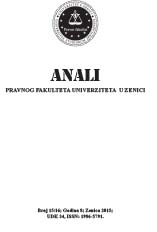
Despite the domination of legal positivism (especially in the second half of the nineteenth and early twentieth centuries) the dispute between justice by nature and justice under the law initiated by the ancient Greek sophists has always been present in various forms of axiological debate about the law in its historical and philosophical sense. Transcending the mythical notions of justice and law in the figures of the goddesses Themis and Dike, Dike in particular - hence dikaion represents justice with two faces: one means retribution and punishment while the other protects the fairness, sophists leave to the latter theorists of law the task to discuss on starting points of the social norms shaped in the concept of nomos. According to mythological tradition opponents of Dike or eris are dispute which disturbs order (Dysnomia - Lawlessness), then bia symbolizing the force opposite righteousness and finally hybris representing excesses / immoderate life. For Protagoras the core meaning of citizen (polites) relates to everyone who has some kind of criteria of the concept of goodness which can’t be judged by no means by an individual (idiotes) while community of citizens (polis)defines the criteria needed for grasping the concept of righteousness (nomos). Sophists are more relevant for this topic because of their knowledge and understanding of the concept of natural rights (physei dikaion), particularly due to their position that is opposed to nomos or nomoi dikaion. These are, above all, Hippias, Antifont, Thrasymachus and Callicles. Hippias, for example, believes that earthly laws tyrannize men and force them to actions which are contrary to the nature of justice which leads to inequalities in the community. The argument for the injustice of earthly laws is in their frequent variability because justice, per definition, should be stable. Because of that these laws are not binding for the wise who live according to the principles physei dikaion. Furthermore Antifont understood physei dikaion as an order of full equality (isonomy) which is usually in conflict with the artificial standards which focus is inequality. Thrasymachus is even more radical and believes that the might create earthly laws for their own protection. The purpose of this work, in this regard, tends to reaffirm the ancient (especially Sophist) remarks about the importance of out-of-standard norms needed for interpretations of standards.
More...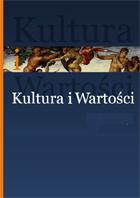
Tematem rozważań jest analiza praktycznego wykorzystania, tworzonych na gruncie filozofii historii, tzw. praw dziejowych. W celu ukazania ich mocnych i słabych stron autor konfrontuje je z prawami formułowanymi na gruncie nauk przyrodniczych. Cel tego zabiegu to stworzenie bilansu, który uwzględni zarówno korzyści płynące z uprawiania historii, jak i jej „naukowe” mankamenty.
More...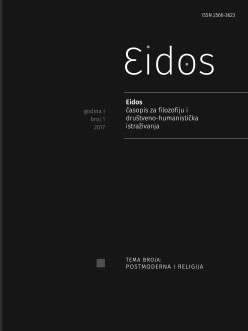
Review of : Spahija Kozić, Filozofija prava, Pravni fakultet u Zenici, 2016.
More...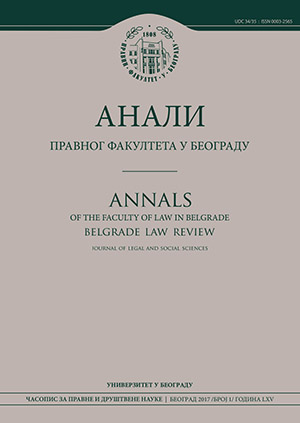
The paper discusses the classical understanding of legal principles as the most general norms of а legal order, confronting it with Dworkin’s and Alexy’s understanding of legal principles as prima facie, unconditional commands. The analysis shows that the common,classical conception brings into question the status of legal principles as norms, by disregarding their usefulness in judicial reasoning, while,conversely, the latter has significant import for legal practice and consequently for legal dogmatics. It is argued that the heuristic fruitfulness of understanding principles as optimization commands thus becomes apparent. When we understand the relation of priciples to the idea of proportionality, as the specific mode of their application, which is different from the supsumtive mode of applying rules,the theory of legal principles advanced by Dworkin and Alexy appears therefore to be descriptively better than others, but not without its flaws.
More...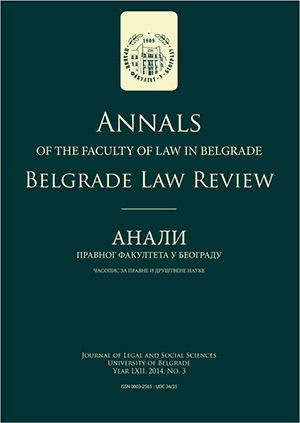
The article introduces the problem of autonomy of law. The paper examines the medieval origins of legal positivism from a historical approach, sketching the main theories concerning the emergence of law, and phrasing some preliminary consideration for a historical and philosophical view of the problem of the birth of law. As a result of reasoning the article suggests some legal historical and human ethological ideas relating to the phenomena of crystallization of the law.
More...
The article contains a research of understanding of the social justice in the ancient society. The concept of "justice" is characterized as a conception which expresses the proportionality of human actions and their correlation between order of the universe and traditions of society.
More...
The author of the article is researching the logical basis of argumentative discourse in the theory and practice of law and analyzing the logical aspects of argumentative activity in legal sphere.
More...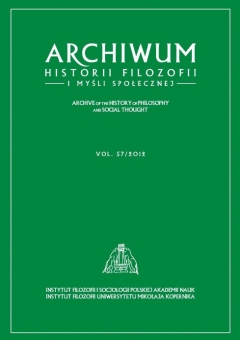
The purpose of this article is to outline Hans Kelsen’s pure theory of law as one of those theoretical achievements that follow the method of Marburg School. Kelsen defends the autonomy of law and its purity as warranted by the transcendental possibility of its grounding. Law according to Kelsen has its origin in the law itself or, to be more precise, law rises from transcendentally comprehended obligation (Sollen). Kelsen’s theory of law is essentially methodological: its sole goal is to answer the question “what is the law and what are its features”, not to answer the question how exactly the law should look like and how it is supposed to emerge. The specificity of law-constructed reality is best seen while scrutinizing the conception of legal person. Legal person is a theoretical construction and bears no resemblance to a real person whatsoever. Therefore, the concept of will in law is purely conceptual construction that is utterly different from the real psychological act of volition. h e law creates a certain non-causal and non-teleological relation, that Kelsen qualii es as Zurechnung – to hold somebody responsible for something. The law is a dynamic system of norms in which one norm is obligatory because emerges from some higher norm. The basic norm is an obligation in the normative sense; basic norm and obligation are relative apriorische Kategorie. The article endeavors to present other fundamental aspects of Kelsen’s theory in their relation to the learning of Marburg School.
More...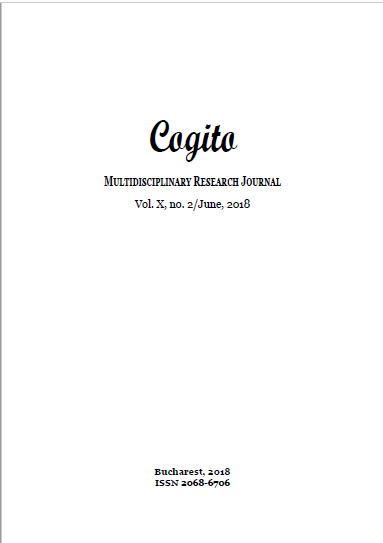
The idea we start from in our approach raises the question of dissociating law from ethics, today, more radically than ever in history. The arguments in support of this idea start from the human nature precarious position, from the current man’s moral degradation in his rush for money and power, the excessive politicization of society, and implicitly of law. Law does not contain those "formal rules" of universal validity; so the moral substance of law does not exist, which can lead to undesirable social inequities in a democratic state. From this perspective, the conclusion of the present research focuses on the idea that law cannot function without ethics in a rule of law state; moreover, law must be subordinated to ethics in order to fulfill its function of objectivity of justice. Therefore, justice is a moral virtue. The very idea of justice is first of all the privileged articulation of morality and "good morals," and also of the virtue of the individual as well as the virtue acquired by everybody in the social space.
More...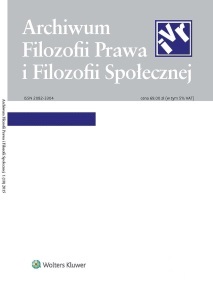
The article concerns cognition of natural law in the process of personalistic introspection and personalistic dialogue. The author points out that the negation of metaphysics that was established in modernity, achieving its zenith in the post-modern thought, leads as a result to alienation of a human being, not only in the sphere of his work, but in his whole spiritual sphere. In this context dialogical philosophy was only a partial answer to these problems, being born out of religious (Buber, Rosenzweig) or anti-totalitarian inspirations (Levinas). This philosophy is not based upon personalistic anthropology which would enable to go from being to obligation, i.e. from cognition of a human being to specifying his ethical vocation and his natural law aims. In the author’s opinion it was Karol Wojtyła in the middle of the 20th century who built the foundations of the new personalistic concept of ethics and natural law through a modern phenomenological and psychological approach of human experience. This concept was rooted in the classical tradition, but it exceeded this tradition at the same time. In the author’s opinion only the full approach of human experience which means spiritual, axiological, ethical and natural law experience through self cognition (personalistic introspection) and cognition of other people (personalistic dialogue) in all spheres of a person (intellectual – spiritual, somatic and emotional) gives a possibility for human cooperation in building a common good.
More...
The aim of the paper is to clarify the concepts of ius and lex, as well as to indicate main interpretations of these concepts in the contemporary jurisprudence. For the concepts of ius and lex are not only of historical significance (as used in the legal discourse of the ancient Rome), but they are present in the entire history of the Western legal culture – since ancient times until today. Owing to this rich historical heritage, as well as to the very nature of the discussed concepts, it is impossible to offer classical definitions of ius and/or lex. Therefore, a proper analysis of their meaning will lead to determination of their ‘connotative field’: a map of associations and theories related to these concepts. In order to realize this task, the paper offers three basic typologies that allow to order mutual relations between existing theoretical standpoints in this field. The first typology concerns a practical function of ius in the legal order. We can distinguish here theories which perceive such a function as mainly negative, positive, or mediating (optimalising). The second typology treats on the sources of binding force of ius. One can indicate positivistic, legalnaturalistic and hermeneutic intepretation of this problem. Finally, the third typology regards mutual relations between ius and lex, which may be described either as hierarchical, or as functionally differentiated. These considerations allow to conclude that the usefulness of such a dualistic way of thinking about the law is ever persisting. Within this perspective the legal order is conceived as containing statutory law (lex) as well as nonwritten binding standards, independent from law–making authorities (ius).
More...
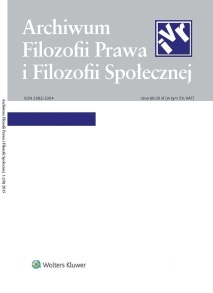
Among the legal professions in Poland, the profession of a legal advisor is the most suitable to show how the responsibility of this job and those who perform it has been perceived over time, in the context of the social and economic changes in the legal environment. The transformation of the job, which in the pre-1989 communist period was performed mostly under an employment contract, into a profession of public trust in the strict sense, was underpinned by radical political, social and economic changes. This article presents how these changes turned the job of a legal advisor into a profession. The area of competencies of legal advisors gradually grew, making these professionals increasingly responsible for maintaining high standards of the rendered services and for setting ever higher ethical requirements. The changes in the methods of practising the profession required regular modifications of codes of professional ethics. This process provides ample evidence that professional conduct is a reflection of the social role which the professionals are expected to play.
More...
In Neil MacCormick’s social ontology, the most important concept is ‘institution’. It is characterised by the notion of the institution’s normative core, which distinguishes the given institution from other institutions of social life. The normative core of an institution consists of a collection of values realised by it and a set of social practices. An analysis of professional ethics according to Neil MacCormick’s social ontology allows us to distinguish the normative core of this institution, which may be cognitively promising for several reasons. First of all, the institutional perspective may be helpful in solving the problems with justifying a lawyer’s power, which is based on formalized ethical codes. Secondly, establishing a central set of professional values and practices will make it easier for participants of the given practice to choose the right course of action. Thirdly, identifying the normative core of legal professions will allow us to determine the extent of interference in the self-government of legal professions.
More...
In this article, the problems of institutional aspects of lawyers’ legal ethics are discussed. On the theoretical plane, the concept of lawyers’ self-government institutions is reinterpreted in the perspective of ‘little ethics’ outlined by Paul Ricoeur’s in his work Oneself as Another. This approach is cognitively justified because, in the light of the assumptions adopted by the philosopher, the ethical aspiration of an entity can be fully realised only in ‘just institutions’. In the first place, the text discusses the fundamental importance of the institution, taking into consideration the achievements of legal meta-ethics. The point of reference for the analyses undertaken by the author is the role played by the concept in question in the ethical and professional codifications of the self-governments of attorneys and legal advisors in Poland. In the key part of the discussion, Ricoeur’s concept of ethics is adopted as the basis for systematizing and reinterpreting the issues relating to institutions of self-government of the legal professions of public trust. Ultimately, the theory of professional ethics, referring to the philosopher’s work, enables characterising in a comprehensive way the ethical aspirations of a lawyer at the internal, interpersonal and institutional levels.
More...
The main aim of the paper is to present a catalogue of relevant categories of personal traits that constitute the so-called ‘Lawyer Personality’. Personal traits influence the choice and the individual way in which a lawyer performs professional roles. The article indicates the typical lawyer personality traits, such as the need for competition and dominance, pragmatism, pessimism, materialism, cynicism, Machiavellianism, a tendency to become aggressive under stress, an ambition-fuelled focus on ‘winning the case’ combined with low interpersonal sensitivity, and an emphasis on the economic aspects of cases. The author calls for strengthening self-reflection and self-awareness among law students and lawyers with regard to their personal traits, which form the individual lawyer personality, in order for each lawyer to find an effective and satisfactory way of practicing law.
More...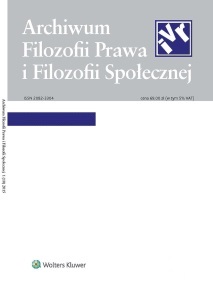
The potential of Feminist Jurisprudence is mainly built on its criticism of Traditional Jurisprudence. Through the deconstruction of the latter’s main categories such as objectivity, justice, equality, and rationality, Feminist Jurisprudence aims to demonstrate that Traditional Jurisprudence tends to mask inequality, exclusion and lack of recognition rather than beingable to bring about change or provide the values under research. What is more, FJ indicates a wide range of topics that are not explored by Traditional Jurisprudence and thus have nochance to be dealt with using traditional tools. As a result, Feminist Jurisprudence provides a separate language, a different epistemology and methodological tools that can broaden access to justice including all subjects by giving them recognition. What follows from thesetwo approaches to jurisprudence and two distinct sets of epistemological assumptions is a different understanding of the subject and a different vision of social relations. As Feminist Jurisprudence convincingly shows, traditional law, with its inclination for objectivity defends legal norms as part of the legal and social order rather than an individual autonomy and integrity of subjects. In this paper I would like to suggest a middle-way solution going beyondthe dualistic categories of objectivity and subjectivity. The proposal calls for a deep structuralchange of the legal discourse as the only one that really matters from the feminist point of view.
More...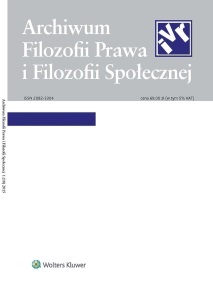
The paper discusses some relationships between the rule of law and the public philosophy. It is unquestionable that nowadays the scientism has become one of the dominant ideologies of industrial and post-industrial societies. Scientists and researchers take an active part in public life, are advisors to governments and corporations, comment in the media important public events. Thus, the problem arises of their moral and legal responsibility for what they say and do in public life. In my opinion, we may distinguish two different models of responsibility, which I call a model of scientist as an ordinary citizen and model of scientist always on duty. To put it another way, we may ask, whether the scientist in public life like an ordinary citizen can act in accordance with his political, economic or religious sympathies and preferences or just like a judge, priest or a physician is always „on duty” and always must follow all the rules of his profession. I defend the view that the adoption of the second model is one of the necessary preconditions of the existence of informed and rational public opinion and thus, the informed and rational rule of law.
More...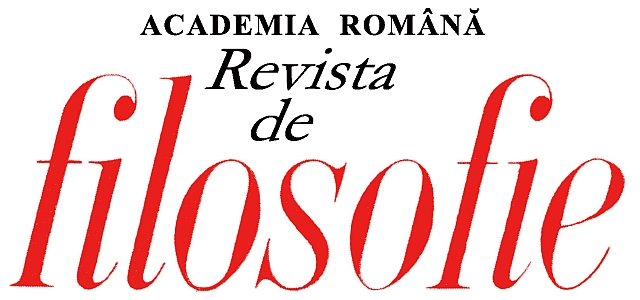
In this article I willbe presenting some definitions of the ethical code given by specialists in appliedethics. I will also be presenting the reasons why I find one of these definitions to be moreconvincing than the others and I will also be pleading for the consolidation of theethical codes on basic moral principles of universal character for different professions.With the purpose of highlighting the fact that the lack of consolidation of ethicalcodes based on moral principles of general understanding makes it difficult to definethe specific rules of a profession leading in the end to a mixture of the types of norms,I will be analyzing the way in which ,,The Ethical and Professional Conduct Code” ofThe Ministry of Work, Family, Social Protection and the Elderly was consolidated. In theend I will draw attention on the necessity for the Romanian organizations to have notonly ethical codes, but especially to have ,,ethical infrastructures” because this is theonly context for an ethical code to function properly.
More...